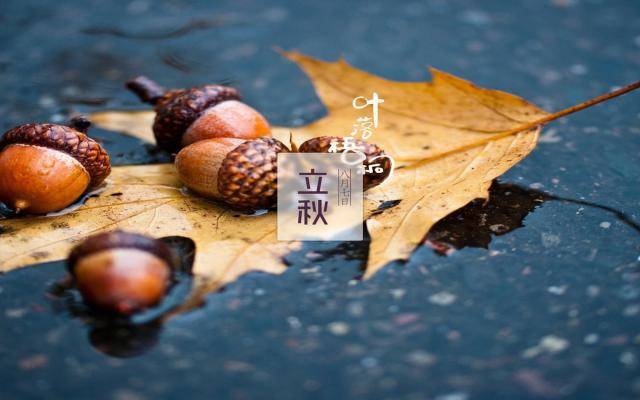Autumn is here! August 8, 2019, Thursday, the eighth day of the seventh lunar month, marks the beginning of autumn.
Autumn is the 13th solar term out of the 24 solar terms, heralding the departure of intense heat and the imminent arrival of autumn. However, it does not mean that the weather will immediately turn cooler after autumn sets in because the last of the three periods of extreme heat lasts until August 20, hence the saying “a hot end to the summer season may kill.”
“Cool and refreshing in the morning after autumn sets in,” even though it’s the end of the extreme heat period, daytime temperatures do not change significantly. However, the temperature difference between day and night will increase, and if proper health precautions are not taken, it may lead to some health issues.
After autumn begins, remember the “Three Precautions, Three Avoidances, Three Beneficial Foods” for a healthy year
1: Guard against dampness
Although autumn has started, the extreme heat period has not ended, and with the gradual onset of autumn rain, under the influence of the “sauna days” during the extreme heat period, the environment may become humid and hot, so it is necessary to guard against dampness to prevent weakness in the spleen caused by dampness.
Dampness can be classified as internal dampness and external dampness. Internal dampness is mostly caused by overconsumption of raw and cold foods or cold drinks, while external dampness is often due to a humid environment.
2: Guard against autumn dryness
After autumn begins, as the extreme heat period ends, the climate will gradually transition from humidity to aridity. Although dryness is not as troublesome as dampness, it can also damage body fluids, leading to symptoms such as dry skin, constipation, and dryness of the mouth and tongue. Additionally, the lungs prefer moistness over dryness, so under the influence of dryness, lung function may be affected, resulting in symptoms of dry cough and shortness of breath due to autumn dryness.
3: Guard against night chill
Under the influence of the extreme heat period, some people are accustomed to keeping windows or fans open while sleeping. However, after autumn starts, the temperature difference between day and night increases, and the body’s immune function decreases during sleep, making it more susceptible to cold drafts. It is advisable to guard against night chill after autumn starts by ensuring proper clothing and bedding.
Avoid the following three things: Avoid cold drinks and cold foods
Due to the hot climate, the spleen and stomach functions are naturally weak. After autumn starts, the spleen and stomach should be promptly regulated. Therefore, do not consume cold drinks or foods to avoid weakening the spleen due to dampness or chilling the stomach.
2: Avoid spicy foods
There is an old saying, “No ginger within a year of autumn.” Foods like ginger and chili are considered hot and spicy. After autumn begins, as the climate gradually becomes drier, consuming spicy foods may easily cause inner heat. Furthermore, spicy foods can exacerbate dehydration in the body, worsening the negative effects of autumn dryness on the lungs. Therefore, it is advisable to consume fewer spicy foods in autumn.
3: Avoid eating watermelon
Watermelon is a cold food and is beneficial for relieving heat in the summer. However, it is not advisable to consume too much watermelon after autumn starts because the season requires nourishing the spleen and stomach with warm foods. If large amounts of watermelon, especially cold watermelon, are consumed, it may lead to a deficiency of the spleen and stomach, affecting their health.
Consume the following three foods: Eat more pears
After autumn begins, as the weather gradually becomes drier, many people experience symptoms such as dry mouth and nose, chest tightness, shortness of breath, dry throat, and a dry cough with little phlegm. This is due to the influence of dryness on the lungs. It’s beneficial to regularly eat pears because pears have the ability to clear heat, transform phlegm, moisten the lungs, and alleviate coughing, helping to alleviate autumn dryness to a certain extent.
2: Eat more lotus root
The maturing season for lotus root falls in autumn, making it the best time for quality and nutrition. Although lotus root is cold in nature, cooking can transform it from cold to warm, providing benefits such as tonifying the spleen and stomach, nourishing yin and beauty, and supplementing qi and blood. It’s particularly suitable for individuals with dry skin in autumn, making it an excellent dietary supplement during the season.
3: Spinach
Spinach is an extremely nutritious vegetable, rich in vitamins A and C, known for its strong antioxidant properties, free radical scavenging abilities, and promotion of collagen synthesis. Autumn spinach is particularly rich in lutein and chlorophyll, offering multiple benefits such as enhancing immunity, promoting blood production, detoxification, among others. With eyes often feeling dry due to autumn dryness, consuming spinach can alleviate such symptoms.
Remember the “Three Precautions, Three Avoidances, Three Beneficial Foods” and pass through autumn and winter in good health and tranquility!


